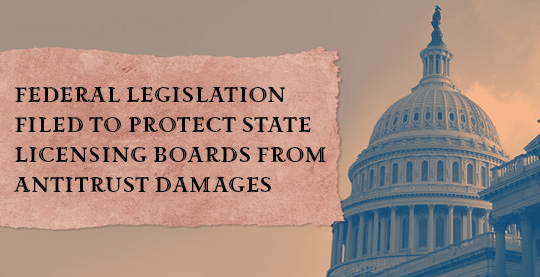SHARE:  NASHVILLE, Tenn., October 26, 2020 – U.S. Representatives Mike Conaway (R-TX-11), Jamie Raskin (D-MD-08) and David Cicilline (D-RI-01), recently introduced the Occupational Licensing Board Antitrust Damages Relief Act of 2020 (H.R.8680), which protects state licensing boards, their board members and staff from legal damages while performing licensing regulation duties that protect the public interest. The purpose of this important legislation is to address the practical antitrust law implications for state professional and occupational licensing boards affected by the Supreme Court’s 2015 decision in North Carolina State Board of Dental Examiners v. Federal Trade Commission. The National Association of State Boards of Accountancy (NASBA) applauds this bipartisan federal legislation to protect state licensing boards from antitrust damages. “State licensing boards provide an invaluable service to the state,” Rep. Conaway explained. “Individuals who serve on these boards should enjoy the same legal protections for working on behalf of the state as all other state officials do. Having served on the Texas State Board of Accountancy myself, I understand that serving on a licensing board is performing an important public service. This legislation ensures that members of state licensing boards will continue to serve the state without fear of personal liability. I am pleased to be working with Reps. Raskin and Cicilline on this bipartisan initiative and encourage my colleagues on both sides of the aisle to support our legislation.” The bill would shield state boards, board members and their staff members from legal damages occurring from their public service. The bipartisan bill still allows for enforcement of anti-trust laws by federal and private entities, and sets the following standards for licensing boards if they are to be immune from damages:
“Public protection can only be attained in its truest form with the passing of this critical legislation,” said NASBA President and CEO Ken L. Bishop. “Since 2015, the actions of State Boards of Accountancy, appointed board members and staff have been placed under a cloud of uncertainty, including the prospect of antitrust treble damages as they carry out their duties under state law. This narrowly targeted bill will ensure state boards can continue their statutory mandate to regulate the practice of public accountancy without threat. I commend U.S. Representatives, Conaway, Raskin and Cicilline for leading this effort. As a former Texas State Board of Accountancy member and chair, Congressman Conaway understands the vital role state board members play to protect the public.” NASBA and 11 other organizations impacted by this legislation include: American Institute of Certified Public Accountants,American Physical Therapy Association, American Psychological Association, American Veterinary Medical Association, Association of State and Provincial Psychology Boards, Council of Landscape Architectural Registration Boards, Federation of Podiatric Medical Boards, Federation of State Boards of Physical Therapy, Federation of State Medical Boards, National Athletic Trainers’ Association Board of Certification, Inc., and the National Board for Certification in Occupational Therapy, Inc. A letter of support submitted by these organizations states, “Passage of this legislation will ensure that all volunteer members, including those representing the public, of state regulatory boards are not deterred from civic-minded service because of the potential for personal monetary damages.” The letter continues, “Our organizations believe that this legislation is a balanced approach to competition policy that retains enforcement mechanisms against anticompetitive activities while ensuring that current and prospective state licensing board members will continue to be willing to serve and are not dissuaded because of uncertainty over any potential personal liability arising from their public service.” |
